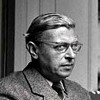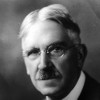“ The highest end of man is not human but divine—participation in pure knowing which constitutes the divine life. ”
John Dewey, Democracy and Education (1916). copy citation
| Author | John Dewey |
|---|---|
| Source | Democracy and Education |
| Topic | life participation |
| Date | 1916 |
| Language | English |
| Reference | |
| Note | |
| Weblink | http://www.gutenberg.org/files/852/852-h/852-h.htm |
Context
“To use the modern phraseology, naturalistic studies are indispensable, but they are in the interests of humanistic and ideal ends.
Aristotle goes even farther, if anything, in the direction of naturalistic studies. He subordinates (ante, p. 254) civic relations to the purely cognitive life. The highest end of man is not human but divine—participation in pure knowing which constitutes the divine life. Such knowing deals with what is universal and necessary, and finds, therefore, a more adequate subject matter in nature at its best than in the transient things of man. If we take what the philosophers stood for in Greek life, rather than the details of what they say, we might summarize by saying that the Greeks were too much interested in free inquiry into natural fact and in the aesthetic enjoyment of nature, and were too deeply conscious of the extent in which society is rooted in nature and subject to its laws, to think of bringing man and nature into conflict.”
source



